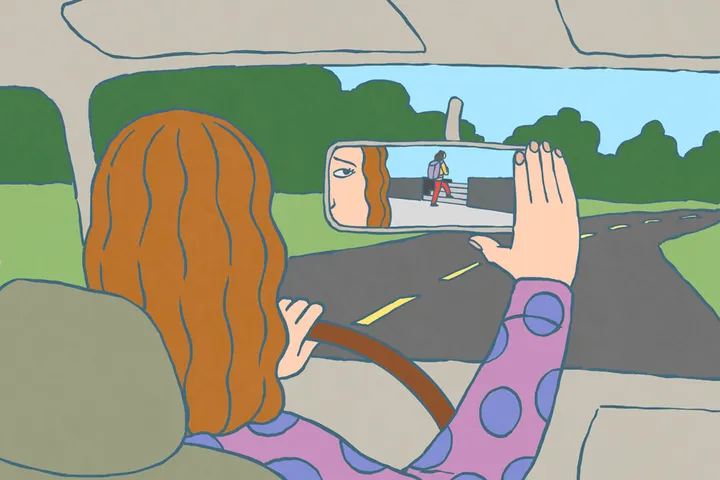My wife and I took one last look at our things—furniture and boxes stacked to the top of the truck—and pulled down the rolling door. It was after midnight. The movers then tied one of our mattresses against the back, the only place left, and we watched them pull away into the darkness. The next day we would follow, moving our family halfway across the country.
 Illustration by Hokyoung Kim
Illustration by Hokyoung Kim
In the morning, as our house shrank and then finally disappeared in the rear-view mirror, my throat tightened, and the enormity of a dozen years washed over me. Our preschooler was now headed to college. His brother would start his freshman year in a new high school. And our daughter, whom we had brought to that house from the hospital, was now in elementary school. Those memories we’d made—the most precious things we were taking with us—could have filled more than a few scrapbooks.
Things had gone haywire from the moment we decided to move. I was taking a new job, but we made our decision in February 2020, and the first Covid-19 lockdowns came less than a month later. More than once that spring my wife asked, “We’re doing the right thing, aren’t we?” I wasn’t always sure, but I wanted to trust that God was leading us to something—and somewhere—new and that He would be with us every mile. And we held onto that assurance all the way to the Oklahoma City limits.
We arrived in high spirits, excited to see and do everything we could. But that turned out to be very little. With the pandemic, most people were staying at home, and the little human contact we did get was hampered by masks and social distancing. That strangeness and desolation even crept into our own home. The shortage of truck drivers delayed our furniture delivery, and for a while we slept on air mattresses and ate at a borrowed card table. Even when churches began meeting in person again, not seeing faces made connections difficult—and everyone was cautious—so we continued to feel like strangers even after weeks of attendance. Meanwhile, my friends back home continued to live their lives, and their photos and posts on social media left me feeling hollow. They were together and getting along perfectly without me.
One night, some dear friends passing through spent a night with us. (In fact, they were sitting in our living room when our furniture truck finally arrived, which felt like Christmas in July.) The moment they left, however, I was surprised at my intense feelings of loss. I felt adrift, as if I’d rowed out to the center of the ocean and thrown my oars and anchor away. I had only the current now, and it seemed to change minute by minute. I had forgotten how it felt to uproot myself and attempt to replant somewhere else.
I shouldn’t have been surprised. Twenty years earlier, after a painful ending to an engagement, I moved back to my old college town and took a job in the admissions office. Despite the familiarity of the surroundings, I couldn’t settle into the community or find where I fit among the students and the town’s longtime residents. In fact, it wasn’t until I married and my wife and settled into a place of our own that I began to feel I fit somewhere again. What would it take to find belonging after this move?
Sometimes I simply wanted someone to blame for the difficulty of our relocation. “What did we do?” was a question we began asking ourselves, only half-joking. In my darker moments, I pointed my finger at God, asking, “What are You doing?” I felt He’d abandoned us. But more often, I couldn’t shake the feeling that we’d somehow abandoned Him by ignoring or rejecting some plan of His. I tried to comfort myself with the thought that I was like the Israelites traveling through the desert from Egypt, with the only life they’d ever known behind them and a mere promise ahead. But when I remembered they could look up and see a pillar of cloud or fire—God’s actual presence—I felt jealous and more alone than ever.
But it turns out the signs had been there all along—I’d simply missed them. There was one Sunday, a few months after our move, when someone we’d met at church greeted us by name and started a conversation. It felt as if we belonged somewhere, strange as that somewhere still was.
Then our children began to make friends. Our son flourished in ways we’d never seen before, developing solid friendships for the first time. His basketball games were bright spots for us as the faces of other parents became familiar. We gradually realized we had friends to sit and talk with during the games. Our daughter, too, found her place by becoming a singer and actor, creating some theater friends for our family to bond with. In fact, our children’s friends led us to the church we attend today, a place where our roots have begun to push down through once hardened soil to the rich ground below.
I cannot point to a single moment when I realized that God had been with us and continued to walk alongside us. There was no epiphany, and at times I wished there had been—my own “pillar moment” so I could have been more confident of the Lord’s presence in our new place. But I’m realizing wisdom gained via hindsight is a gift from God, too.
And in hindsight, I see the common thread—the key to my assurance—was His people: the new friends who listened and walked with us as we established a life in their community. It was through increasingly familiar and loved faces that I grew to understand we belonged in Oklahoma City and on this path with God. Now, a future in our not-so-new place no longer seems unimaginable.
Don’t get me wrong—I continue to ask God what He is doing. But my concern now is to join Him in what He’s doing where I am. And though a pillar of cloud or fire would be amazing, I’ve come to appreciate the endless evening sky the Midwest has to offer, to see in its colors a tangible reminder that God will be with us as long as we walk under it.





